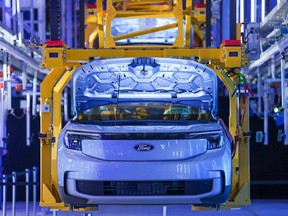Peers including Volkswagen AG and Stellantis NV have issued profit warnings in recent months

The reductions — which amount to about 14 per cent of Ford Europe’s workforce — will primarily hit operations in Germany and the United Kingdom by the end of 2027, pending consultations with unions and governments. The automaker also announced it will reduce production of Explorer and Capri EVs at its complex in Cologne, Germany.
“What we lack in Europe and Germany is an unmistakable, clear policy agenda to advance e-mobility,” John Lawler, Ford’s vice-chairman and chief financial officer, said in a statement. He called for more public investment in charging infrastructure, meaningful EV incentives and greater flexibility in CO2 emissions-reduction targets, which the EU and U.K. are making more stringent next year.
Ford shares fell as much as 3.5 per cent as of 11:45 a.m. Wednesday in New York. The stock has plunged 27 per cent since mid-July, when the company revealed soaring warranty expenses linked to recalls and quality issues were eating into profit.
Ford’s share of Europe’s passenger car market shrank to just 3.3 per cent in the first nine months, from 4.1 per cent during the same span last year, according to the European Automobile Manufacturers’ Association. The automaker is more competitive in the commercial vehicle business, which will take longer to electrify.
Chief executive Jim Farley is pressuring executives worldwide to lower costs that have put Ford at a competitive disadvantage to rivals.
“The biggest opportunity for Ford, or unlock for Ford, is our cost structure,” Lawler told analysts Wednesday at an industry conference hosted by Barclays. The company is “getting after the $7 billion of cost that we have relative to competition.”
Ford plans to cut about 2,900 positions in Germany, 800 in the U.K. and 300 in the rest of the region. A U.K. spokesperson said the government had asked the company to share its full plans so that it can help mitigate the impact.
“This is obviously a difficult day for Ford in Europe,” said Peter Godsell, vice-president of human resources. “But we do believe this is necessary given the situation that we’re facing.”
Godsell specifically cited a significant increase in competition from Chinese manufacturers. “Our feeling is that we’re not on a level playing field as it relates to that competition, knowing it’s subsidized,” he said.
The job cuts mark yet another setback to Germany’s struggling industrial base. Last week, the Council of Economic Experts that advises the government scrapped its forecast for economic growth in 2024 to predict a second year of contraction, followed by just 0.4 per cent expansion in 2025.
Ford will schedule short-time working days in Cologne for the first quarter and is scheduled to cease production at its factory in Saarlouis, Germany, next year. Volkswagen is weighing its first-ever factory closures in its home country, and suppliers including Schaeffler AG and ZF Friedrichshafen are eliminating thousands of positions.
—With assistance from Jamie Nimmo and Joe Mayes.